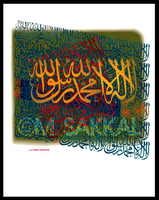 'The greatest poverty is the lack of intelligence'
'The greatest poverty is the lack of intelligence' By Sharida Mohamedjoesoef, Ramadan Roundup IV for the Amsterdam Weekly
This time, no story from a stately canal house, a state-of-the-art glass terminal or some posh theatre. And no big wigs or cameras in sight either for, this time, your rambling Ramadan reporter set out for De Baarsjes, home to many Muslims and referred to by some as 'Casablanca aan de Amstel'. The sun had already set when I finally arrived at my destination, a small community centre near Mercatorplein. Dozens of people of various age groups and ethnic backgrounds were merrily chatting away while waiting for the debate to start. Insofar as I'm concerned, the organisation deserves full marks for its choice of topic for the debate: religion and culture. True, it was noisy, if not chaotic, at times but at least there were hardly any politically correct speeches.
The panel consisted of five people, each representing one of the three main monotheistic traditions: Judaism, Christianity and Islam. Hats off to the only woman on board, Maimunah van der Heide; without getting down to the theological nuts and bolts, she still made it quite clear that many Muslims often mix religion up with culture and that cultural practices are more and more being elevated to the level of religion. 'Don't be fooled by Koranic literates or people dressed in Islamic attire. That's just the outside and certainly no claim to sainthood,' she said.
Black-veiled Van der Heide knows what she's talking about. She converted to Islam when she was in her teens and began spending her life in the service of her new found religion. Eventually, Van der Heide set up an organisation called Stichting Vangnet [safety net], a centre for Muslim girls who are in some kind of trouble. Vangnet was first housed in a mosque, but was forced to relocate because the mosque was first and foremost a house of prayer, or so mosque leaders believed.
Van der Heide as well as the other panelists knew their religious ABC, but the fact is that ordinary believers often do not. Big deal, you might think, but it's a different story altogether when you're Muslim and find yourself and/or your religion subject to scrutiny. There is no denying that much of the current focus on Muslims and Islam was brought about by the events of 9/11. Overnight, the Koran became an instant bestseller. But the Koran, even in translation, is not an easy book to understand, so, if you want more information, it is only logical that you start looking elsewhere.
Ay, there's the rub: ever wondered what happens if clueless non-Muslims start taking their cues from the equally clueless young secular Mohammads and Fatimas from the local shop around the corner, or from radical Islamic websites? For one thing, you could end up with a teacher at an ordinary secondary school telling you that, according to Islam, only girls have to stay virgins or that according to that same religion, newly weds must show a bloodstained sheet after their wedding night to prove that the bride really was a virgin. Speculation? I wish... There's at least one school here in Amsterdam where the above is actually the case. Their handouts did not contain a single clue as to the source of such statements.Quite painful, given the fact that in the Netherlands we now have around 30 Islamic schools, two Islamic universities and even two advisory governmental bodies on Islamic issues. And still we are a far cry from having some kind of uniform quality code for comprehensive, reliable sources on Islam!
P.S. you can search the Koran all you want and still you won't find any verses acknowledging any of the above as proper Islamic conduct.
 'The greatest poverty is the lack of intelligence
'The greatest poverty is the lack of intelligence